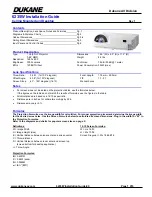
E
NGLISH
-41
Adjustments
and
settings
40-E
NGLISH
RESIZING
This should normally be set to “ON”.
(This setting is only for signals
which have lower resolutions than
the LCD panels. Refer to page 58
for details.)
ON
The pixel resolution of the input
signal is converted to the same
resolution as the LCD panels before
being projected. For signals with
lower resolutions, gaps in the pixels
are automatically interpolated into
the picture before it is projected.
This may sometimes cause
problems with the quality of the
picture.
OFF
The input signal is projected at its
original resolution, with no pixel
conversion. The projected picture
will be smaller than normal, so
adjust the zoom setting or move the
projector forwards or backwards to
adjust the picture size if necessary.
If set to “OFF”, some features, such
as “D.ZOOM” (digital zoom),
“KEYSTONE” or “INDEX WINDOW”
will not function.
FRAME LOCK
If the picture’s condition is bad while
a RGB moving picture is projected,
set “FRAME LOCK” to “ON”. Refer
to page 58 for compatible RGB
signals.
Changing the display language
Press the
F
or
G
button on the projector or remote control unit to select a
language, then press the ENTER button to accept the setting.
Indicates the language which is
currently set.
L A N G U A G E E N G L I S H
E N G L I S H
D E U T S C H
F R A N Ç A I S
E S P A Ñ O L
I T A L I A N O
S E L E C T E N T E R R E T R N
NOTE:
B
If a selected mode does not
match the aspect ratio of the
input signal, it may affect the
quality of viewing of the
original picture. Keep this in
mind when selecting the
aspect ratio.
B
If using this projector in places
such as cafes or hotels to
display programs for a
commercial purpose or for
public presentation, note that if
the aspect ratio (16:9)
selection function is used to
change the aspect ratio of the
screen picture, you may be
infringing the rights of the
original copyright owner for
that program under copyright
protection laws.
B
If a normal (4:3) picture which
was not originally intended for
wide-screen viewing is
projected onto a wide screen,
distortion may occur around
the edges of the picture, or
part of the picture may not be
visible. Such programs should
be viewed in 4:3 mode to give
proper consideration to the
aims and intentions of the
original program’s creator.
















































